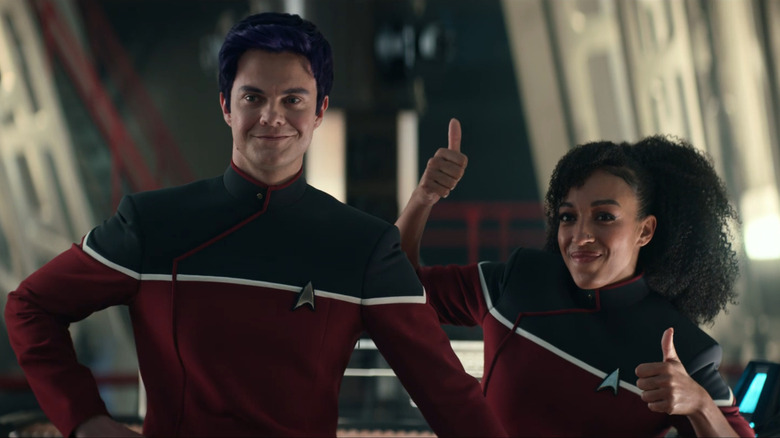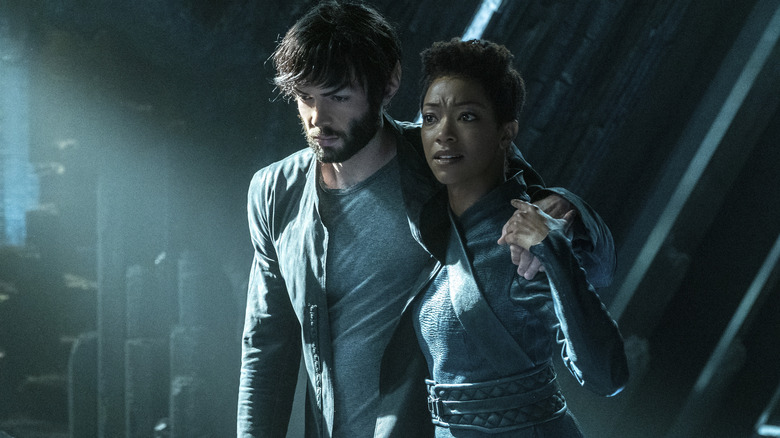Star Trek's Big Decision Makers Listen To Fans – Just Not The Toxic Ones
Ah, the wonders of the internet. When humanity first discovered electricity (in the spirit of "Star Trek" nerdery, here's an enlightening fun fact: it wasn't Benjamin Franklin!), the original trailblazers couldn't have possibly known what they'd eventually unleash upon our species. On one hand, the invention of computers and our entire online ecosystem as we know it means we have easier access to writers, actors, and other artists than we've ever had before. But, on the negative side of the equation, we have easier access to writers, actors, and other artists than we've ever had before. Is anyone else hearing that echo here?
Yeah, let's just put it this way — in a time when studios are relying on popular franchises and IPs more than anything else, the ever-present specter of, ah, passionate fans with strong opinions looms large over the vast majority of productions. Hyperbolic fandom feedback isn't exactly a new phenomenon, judging by how audiences originally responded to divisive movies like "The Empire Strikes Back" or the casting of major roles like Michael Keaton as Batman, but the advent of the internet certainly helped speed up and magnify the entire process. Like it or not, toxic fandom has become an undeniably real issue with real ramifications.
Trekkies in particular have always had a way of making their feelings known to the storytellers in charge and Paramount's recent output of movies and shows alike are no exception, as current "Trek" figurehead Alex Kurtzman has had firsthand experience with. There have certainly been some bumps along the way, but it appears that the franchise veteran has managed to reach a healthy equilibrium between telling stories as he and his writers see fit versus listening to outside feedback. In short, fandom input is taken into account ... but only to a point.
Healthy boundaries
It's the quintessential "Trek" conundrum about the needs of the many versus the needs of the few. Directors, writers, actors, and everyone in between have a duty to tell the absolute best stories that they possibly can, regardless of how the most hardcore fans might feel about it. But, at the same time, there's the reality that the concerns and thoughts of the more reasonable fans out there might be worth paying attention to on occasion. I personally don't envy anybody in the position of having to make such difficult calls on a daily basis, but Alex Kurtzman seems to have figured out the trick with "Star Trek."
In a new profile by Variety, the longtime franchise writer and producer remarked upon dealing with various different reactions received by some of the more divisive "Trek" shows in recent years. "Star Trek: Discovery," for instance, caused quite a stir by introducing the new character of Michael Burnham (Sonequa Martin-Green) as the secret adoptive sister to Spock. Meanwhile, the animated series "Lower Decks" shocked more old-school fans with its course language, zany tone, and irreverent humor. So whose opinions are worth giving the time of day to and whose aren't? According to Kurtzman:
"We listened to a lot of it. I think I've been able to separate the toxic fandom from really true fans who love 'Star Trek' and want you to hear what they have to say about what they would like to see."
How's that for a refreshing amount of honesty? The best storytellers know there's simply no pleasing everyone, so at a certain point one must trust their own instincts. That said, it's obvious to see how shows like "Discovery" course-corrected in response to constructive criticism. Hopefully, Kurtzman's balanced approach will be just what "Star Trek" needs.

